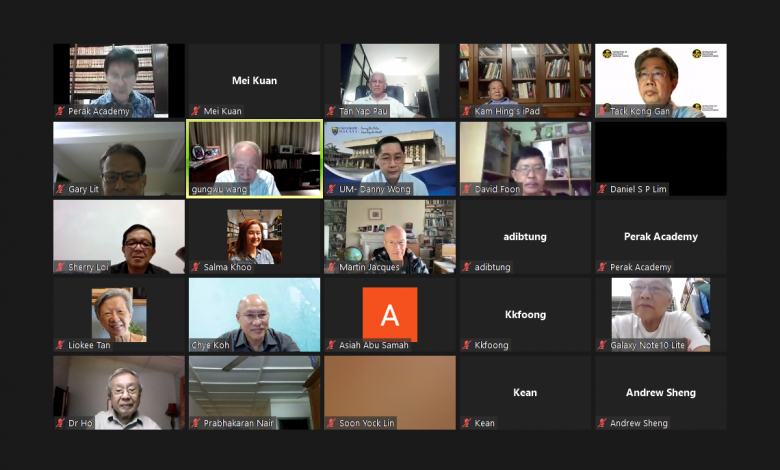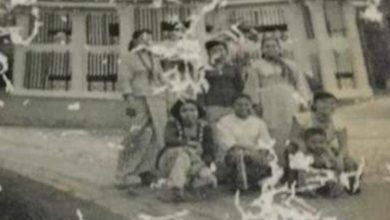

By Mei Kuan
Running on the theme “Down Memory Lane”, a recent zoom webinar held by the Perak Academy featured 91-year-old Emeritus Professor Wang Gungwu, the author of “Home Is Not Here” (2018) and “Home Is Where We Are” (2020) who calls Ipoh his hometown.
The renowned historian and sinologist was born in Surabaya, Indonesia to Chinese parents from Taizhou, Jiangsu and grew up in Ipoh.
After completing his secondary education in Anderson School, Wang left Ipoh in 1949.
The first talk in its twenty-third series began with a personal tribute to Wang by Koh Chye Hock, author of “The Chronicler: One Man’s Diary on Life”, on behalf of the academy.
“I owe Professor Wang an immense debt of gratitude for writing ‘Home Is Not Here’ and ‘Home Is Where We Are’. His recollections of his life in Ipoh breathe life into the personal and the spatial setting of an era in Ipoh I had not experienced, but in which people vital to my life had lived,” Chye expressed, adding that it was a distinctive honor for him to pay a personal tribute to Wang as a fellow Ipohite and Andersonian.
“Although the two books are less densely academic and more intensely autobiographical and recollective, they are as ground-breaking as his other scholarly works,” he highlighted.
It was followed by a formal introduction of the speaker by Prof Dr Danny Wong Tze Ken, Dean of the Faculty of Arts and Social Sciences of University of Malaya.
Wang studied history in the University of Malaya, where he received his bachelor’s and master’s degrees. He was a founding member of the University Socialist Club and its founding president in 1953.
He lectured at University of Malaya, Singapore from 1957 to 1959 and University of Malaya, Kuala Lumpur from 1959 to 1968.
In 1963, Wang was appointed Professor of History, one of the youngest professors ever appointed at the University of Malaya.
“Many former students will remember Prof Wang as an inspiring lecturer. He was approachable and always had time for students whether they were first-year undergraduates or postgraduate students,” Danny shared.
In his two volumes, Wang wrote how the very critical years of growing up in Ipoh affected his life thereafter directly or indirectly.
“It stands as a major landmark in my life. I recognised a long time ago that it is actually my hometown, even though I was not born there and I left a long time ago,” Wang explained.
“I grew up in two small towns. The first ten years of my life in Ipoh were spent almost entirely in a place called Greentown, with occasional excursions to the main town, mainly to New Town with my father to a bookshop or to see a film,” he recalled.
“During the Japanese occupation, I was driven out of one small town to another small town—the other small town being the Old and New Town of Ipoh. At the time, to me, it was no more than old Hugh Low Street, Brewster Road, Belfield Street and some side lanes,” he continued.
“Growing up in two small towns, it had a very interesting effect on me because it made me feel that the world was very tiny but very safe. It’s hard to capture that again today,” he stated.
The two-hour stimulating talk concluded with a question-and-answer session.
Present was Chan Kok Keong, the Deputy Chairman of Perak Academy.
Established in 2002, the Perak Academy is an independent, privately-funded organisation with the primary objective of promoting interest in the state of Perak by encouraging discussion, scholarship and research.
To learn more, visit the Perak Academy website.
=============================
Get your local news fast. Download the Ipoh Echo App on your mobile. Available on both Google Playstore and Apple Appstore.


